- Home
- Kay Hooper
Sense of Evil Page 14
Sense of Evil Read online
Page 14
“In any case, the visionary killer feels he's controlled by something alien, something that is no part of himself. Sometimes he ignores or fights the voices or visions for years before they finally overpower his will. Bottom line, he's a puppet with someone else—or something else—pulling his strings.”
“Okay,” Hollis said, studying the notes in her hand and then looking up as Mallory pulled the police Jeep to the curb and parked. “This should be it. Last place on Jamie's list of properties.”
“What're we expecting to find here?” Mallory wondered, eyeing the boarded-up front window of what had once, years before, been a gas station. “According to her broker, Jamie planned to sell this place.”
“Yeah, but he also said that wasn't the original plan. She bought this property meaning to raze what's here and build a nice little place to fit in with the boutiques popping up at this end of town. It would have vastly increased the value of the property. Then she very suddenly decided to just sell out.”
“But she made that decision about several of the properties we've looked at. And the broker didn't say suddenly, he said somewhat unexpectedly.”
“Somewhat unexpectedly about three months ago. Isabel says that fits the time frame; it's when Jamie started showing signs of nerves. Deciding to unload so much of her property virtually all at once even if it meant taking a loss was out of character, and when people do things out of character there's usually a good reason behind the actions.”
“Like she accidentally killed a lover, maybe. But what was the plan after she sold out? Did she mean to get her hands on all the cash she could so she could leave town?”
“Could be. Isabel thinks there's a possibility.”
“Then why are we checking out these places? She wouldn't have hidden the photo box—or any other keepsake—in a place she was going to sell. You don't think we're going to find a body in there?”
“Well, you know as well as I do, the state crime network coughed up a list of at least three women of roughly the right age reported missing in this general area at about the same time Jamie got nervous. The police in each district believe all three women did not leave of their own free will, which makes homicide at least a possibility. And . . . if things did get out of hand in one of Jamie's little games, she had to do something with the body.”
“Hide it in a building she owned herself and was planning to sell?”
“I wouldn't call it a smart thing to do. Unless she figured out a way to completely destroy the body or completely hide it even if the building came down. Or unless she planned to be far away and living under an assumed name or something by the time anything was discovered.”
“Interesting possibilities,” Mallory agreed. “Okay. Grab your flashlight and let's check it out.”
Isabel turned her gaze to the bulletin boards across the room, which had, Rafe noted, acquired what looked like canvas drop cloths that could be conveniently lowered to cover the boards whenever unauthorized persons were present.
The cloths were lowered now, presumably because Alan had been in the room.
Absently, she said, “Mallory thought the drop cloths would be a good idea, so she fixed them. We can keep the boards covered most of the time, unless we're in here working. Less chance of too much information leaking out.”
“Isabel? Could a visionary killer gain control over his voices for years between killing sprees? Could he live normally during those years?”
“That would be . . . unusual.”
“But would it be possible? Could it be? Are we dealing with a killer who really isn't responsible—at least legally—for what he's doing?”
“That might depend on the trigger—and the reason or reasons behind all this.”
“What do you mean?”
“I mean the human mind, the human psyche, is a very complicated beast. Generally speaking, it knows how to protect itself, or the most fragile aspects of itself. If he's hearing voices or seeing visions, and they're commanding him to do things utterly alien to his nature, then sure—he could forget about them the moment the voices or visions stop.”
“For years on end?”
“Maybe. And then something happens in his life to trigger this psychosis, and his sick and twisted alter ego comes out to play.”
“For six weeks. Six women. Six murders.”
“The number, the time period, both have to be relevant, either tied to an event somewhere in his past or tied to the psychosis. To his voices.”
“Which is your guess?”
Isabel thought for a moment, then said, “Childhood. The majority of the traumas that affect us most deeply occur in childhood. It's when we're most vulnerable.”
“What about the idea that he's schizophrenic?”
“There are schizophrenics able to function, with medication and other treatment. No pharmacy within a hundred miles has filled a prescription for the sort of medication that would be needed.”
Rafe lifted his brows. “Already checked that out?”
“Well, the profile noted the possibility of schizophrenia, so it seemed prudent. An inquiry from the Bureau tends to carry a bit of weight, and since we weren't asking for specific patient information or identification, all the pharmacies were happy to cooperate.”
“Okay. So we can be pretty sure he isn't being treated for schizophrenia.”
“Which doesn't rule out him having it. Or that he's getting psychiatric treatment without medication. We haven't checked with doctors.”
“Because they wouldn't disclose the information.”
“Not willingly. They have a responsibility to report it if they believe a patient has committed or is about to commit a violent crime, but that sort of treatment can take years before the doctor truly begins to understand his or her patient.”
“And understand what the voices are making him do.”
“Exactly. In any case, my guess is that our guy isn't getting treatment of any kind. Whether he's aware of being sick is an open question; whether he knows what he's done is another one. From the information we've gathered so far, there's just no way to be certain.”
“Earlier, you said some schizophrenics were, literally, possessed by another person, another soul trying to take over. Is that possible in this case?”
Isabel shook her head. “So far, we've never encountered a person in that condition who wasn't in a mental institution and under restraints or drugged into a stupor. We don't believe such a person could function normally under any conditions—far less something like this. There's just too much violence going on in the brain itself to allow even the appearance of normalcy.”
“And our killer appears normal.”
“Yes. No matter how screwed up his childhood may have been, or how many voices he might be listening to, he's able to function normally to all outward appearances.”
After a moment, Rafe said, “I think I'd prefer an evil killer who knows exactly what he's doing, sick as it is. At least then it would be . . .”
“Simpler,” she agreed wryly. “Black and white, no shades of gray. No agonizing over who or what is really responsible. No reason to hesitate or regret. But you know as well as I do that it's seldom that easy.”
“Yeah. As Hollis said, the universe never seems to want to play it that way. Listen . . . we aren't talking about a psychic killer, are we?”
“Christ, I hope not.” With a sigh, she returned her gaze to his face. “True visionary killers are delusional, Rafe. They believe they hear the voices of demons or the voice of God. They're being commanded to do things they wouldn't ordinarily do, for reasons the sane among us would find completely nuts. They aren't psychic; what they're experiencing isn't real except inside their own twisted minds.”
9
IT HADN'T TAKEN ALAN long to find the information he was looking for on Jack the Ripper, and he was somewhat chagrined to see just how much information was readily available via the Internet on the case.
Just as Isabel had said.
She hadn't exactly thrown a gauntlet at his feet, but Alan nevertheless felt challenged to somehow best the federal agent. And Rafe, of course. It would be nice, he thought, to get the upper hand with Rafe.
Just once, for Christ's sake.
The problem was, Alan hardly had access to the sort of databases of information the police and feds could command. But there was one thing he did have, and that was knowledge of this town and its people.
The question was, could he use that?
He wasn't able to speak to Mallory as he left the station, since she wasn't there, so he didn't know whether to expect a visit from her tonight. After last night, he figured he probably wouldn't see her for days; whenever she showed him any signs of vulnerability—falling asleep in his arms would definitely be listed in that column, he knew—she tended to retreat for a while both literally and figuratively.
In any case, he had learned the hard way not to plan his days or nights around her. He got in his car at the station and checked his watch, debating silently, then started the car.
It was time he tapped all his sources.
4:45 PM
Rafe had a hunch Isabel's explanation contained a but, so he asked. “But?”
“But . . . we've encountered serial killers before who also happened to be psychic, so the two aren't exactly mutually exclusive. In fact, some researchers believe that serial killers and psychics have something in common: an unusual amount of electromagnetic energy in the brain.”
“Which means?”
“Which means we are or could be kindred spirits, scary as that sounds. The excess energy in a psychic seems to activate an area of the brain most people don't appear to use, an area we believe controls psychic abilities. The energy in a serial killer tends to sort of go wild, building up in different areas of the brain, especially in the rage center, and since it has no way to be channeled, you end up with synapses misfiring right and left. Burned-out or overloaded areas of the brain could trigger the compulsion to kill.”
“So that's one theory.”
“One of many. And that theory holds something else to be a possibility. That a serial murderer can also become psychic. Which comes first in that case, the psychic ability or the insanity, is still an open and much debated question.”
“Does it matter?”
“Well, yeah, for some of us.” Her voice was light. “I hear voices, Rafe, remember?”
“Voices you don't attribute to God or a demon. Voices that don't command you to kill.”
“Not even on the worst day yet, I'm happy to say. So far, so good.” She shook her head slightly. “But returning to the point—a psychic killer is possible.”
“Would you know? I mean, could you tell if that were the case?”
“Not necessarily. Psychics can often recognize each other as psychic, but not always.”
“Shields,” he said, remembering what Hollis had told him. “Yet another instance of the mind protecting itself.”
“Hollis said she mentioned that.” Isabel didn't seem disturbed by it. “And it is one reason we don't always recognize each other. Also, nonpsychic people frequently develop shields of their own, for privacy or protection, especially in small towns where everybody tends to know everybody else's business. It's a lot more common than you might think. Hell, I could talk to the killer every day, never knowing he's the murderer and never picking up psychic ability—or psychotic voices in his head.”
For the first time since he'd returned, she sounded tired, and it made him say, “How close are Mallory and Hollis to finishing up?” He was about to suggest calling one of them, but Isabel automatically used a more direct line of communication.
“They are . . .” She frowned, concentrating. “. . . at the last property on the list, I think. What used to be a gas—” Her face changed, tightened.
Watching her, Rafe was conscious of the same uneasiness he'd felt in Jamie's “playhouse.” She was somewhere else, somewhere distant from here. He wanted to reach over and touch her, anchor her here somehow.
She came abruptly to her feet. “Oh, Christ.”
“You know, for a gas station, this is a huge building.” Mallory's voice echoed.
They were in the rear area, which was divided into at least three separate rooms, all apparently cavernous; the one they were presently exploring had a concrete floor and high windows so dirty they admitted almost no light. Rusted pieces and parts from old cars still hung on hooks and racks on the cinder-block walls, and piles of junk lay everywhere.
Every time Mallory moved the beam of her flashlight, it seemed to catch something metallic and glare back at her, like something springing out of the shadows.
Unsettling.
“Tell me about it. I'm guessing it didn't start out life as a gas station.” Hollis pointed her flashlight into a dark corner and jumped when an unexpectedly shiny chrome bumper glinted brightly. “Jesus.”
Mallory jumped in the same instant, but in her case it was because something skittered across her foot. “Shit. I hate rats, but I hope that's what just ran across my foot.”
Hollis didn't care for rats herself, but she was standing before what looked like a solid steel door that held her interest at the moment. The door was padlocked. “Never mind the rats. Take a look at this.”
Mallory joined her. “I can't never mind rats. I hate rats. And I'm going to throw these shoes away. Yuck.” Her flashlight beam joined Hollis's. “Is that a new lock?”
“I'd say so. Hold on a minute.” She juggled her flashlight briefly before tucking it under her arm as she dug into the waist pack she was wearing. She put on a pair of latex gloves, then produced a small, zippered leather case.
Mallory watched with interest. “Burglar's tools? You didn't bring those out at Jamie's playhouse.”
“I didn't have to, you had the locksmith's tools.” Hollis smiled suddenly. “I've been hoping there'd be an opportunity for me to try out my lock-picking skills. They haven't been field-tested yet.” She selected a couple of tools and bent to begin working on the lock.
“You learned this at Quantico?”
“From Bishop. It's sort of fascinating which skills he determines to be most important to a new agent. Handling a gun without shooting myself in the foot and with reasonable accuracy—check. Being able to use a form of autohypnosis and biofeedback to focus and concentrate—check. Ability to talk to the dead—a major plus. Being able to pick various and sundry locks—check. Or, at least, so I hope.”
Mallory laughed under her breath. “You know, I'd really like to meet this Bishop of yours. He sounds like a very interesting man.”
“He certainly is. Damn. Shine your light right here, will you?”
Mallory complied.
“Wait—I think—” There was a soft click, and Hollis opened the padlock with a flourish. “Ta-da. What do you know, I can do this. I wasn't at all sure I could.”
“Congratulations.”
“Thank you.” She put away the tools, then had to put her shoulder against the door to push it inward. And the moment it was open a few inches Hollis immediately stepped back. “Oh, shit.”
The two women looked at each other, and Mallory said, “I haven't had the misfortune to stumble across a decomposing human corpse, but I'm guessing that's what one would smell like. Please tell me I'm wrong.”
Breathing through her mouth, Hollis said, “I'm pretty sure that's what it is. Part of the training I got was a visit to the body farm—where students and forensics specialists study decomposition. It's not an odor you easily forget.”
Mallory stared at the partially open door. “I'm not looking forward to seeing what's inside there.”
“No, me either.” Hollis eyed her. “Want to wait and call in reinforcements?”
“No. No, dammit. With a padlocked door and that smell, there's obviously nothing dangerous in there. Nothing alive, I mean. We have to open the door and look, make sure it's not some dead animal in there. Then call it in.”
Hollis br
aced herself mentally and emotionally—and did her best to shore up her psychic shields. Then she and Mallory shouldered the door all the way open and stepped inside.
“Jesus,” Mallory whispered.
Hollis might have echoed her, if she could have forced words past the sick lump in her throat.
It was a bare room, for the most part, with only a few shelves along one wall to show it had been used at least once for storage. The high windows admitted just enough illumination, from the southwestern corner of the building and the hot sun low enough in the sky, to provide mote-filled beams of light focused on the center of the room.
On her.
One end of a thick, rusted chain was wrapped around a steel I-beam overhead, while at the other end of the chain a big hook jutted from between her rope-bound wrists. She dangled, literally, from the hook, her feet several inches above the floor. There was nothing beneath her except rusty stains on the concrete.
Thick, dark hair hung down to mostly obscure her face. The clothing she had worn, a once-demure blouse and skirt, had been shredded, but very neatly, methodically, almost artistically. The material provided a fringe that almost hid what had been done to her body.
Almost.
“Jamie didn't do this,” Mallory whispered. “She couldn't have done this.”
“Nothing human could have done this,” Hollis responded, her own voice thin. “It's like he was curious to see what color her insides were.”
Mallory backed out of the room, gagging, and Hollis didn't have to follow to know the other cop was throwing up everything she'd eaten today.
Her own stomach churning, Hollis reached for her cell phone, her gaze fixed on the dangling and decomposing body of a woman who'd been gutted like a fish.
6:00 PM
The medical examiner for the county, Dr. David James, was a normally dour man, and a scene like this one didn't make him any more cheerful.

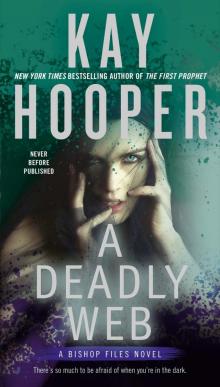 A Deadly Web
A Deadly Web Raven on the Wing
Raven on the Wing Always a Thief
Always a Thief Star-Crossed Lovers
Star-Crossed Lovers Blood Dreams
Blood Dreams Shades of Gray
Shades of Gray Rebel Waltz
Rebel Waltz Chill of Fear
Chill of Fear Sleeping With Fear
Sleeping With Fear After Caroline
After Caroline Time After Time
Time After Time Haunting Rachel
Haunting Rachel Hunting Fear
Hunting Fear Out of the Shadows
Out of the Shadows Whisper of Evil
Whisper of Evil Blood Sins
Blood Sins Hiding in the Shadows
Hiding in the Shadows C.J.'s Fate C.J.'s Fate C.J.'s Fate
C.J.'s Fate C.J.'s Fate C.J.'s Fate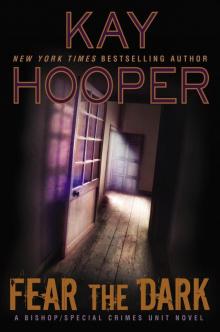 Fear the Dark
Fear the Dark Illegal Possession
Illegal Possession Stealing Shadows
Stealing Shadows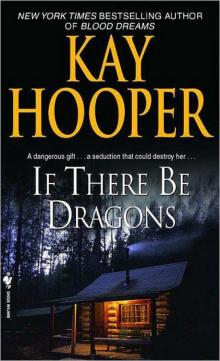 If There Be Dragons
If There Be Dragons Once a Thief
Once a Thief In Serena's Web
In Serena's Web On Wings of Magic on Wings of Magic
On Wings of Magic on Wings of Magic Hostage
Hostage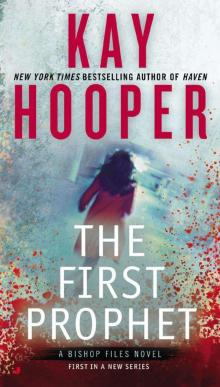 The First Prophet
The First Prophet Through the Looking Glass
Through the Looking Glass Golden Flames
Golden Flames Finding Laura
Finding Laura Haven
Haven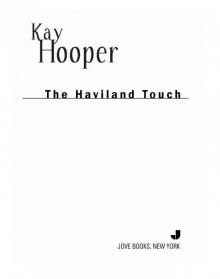 The Haviland Touch
The Haviland Touch The Lady and the Lion
The Lady and the Lion Haunted
Haunted Velvet Ligntning
Velvet Ligntning Blood Ties
Blood Ties Adelaide, the Enchantress
Adelaide, the Enchantress The Matchmaker
The Matchmaker Golden Threads
Golden Threads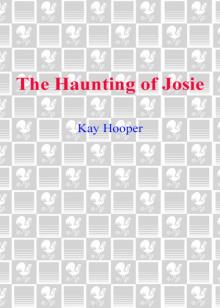 The Haunting of Josie
The Haunting of Josie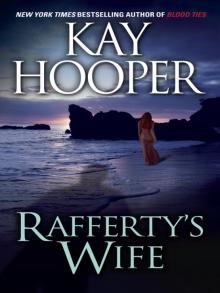 Rafferty's Wife
Rafferty's Wife Amanda
Amanda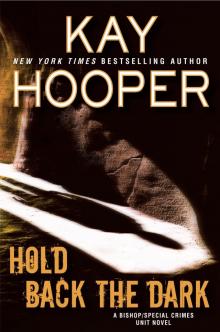 Hold Back the Dark
Hold Back the Dark Sense of Evil
Sense of Evil What Dreams May Come
What Dreams May Come Larger Than Life
Larger Than Life Enemy Mine
Enemy Mine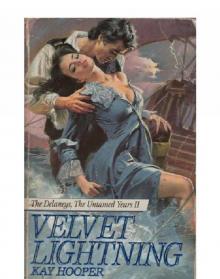 Velvet Lightning
Velvet Lightning The Fall of Lucas Kendrick
The Fall of Lucas Kendrick Aces High
Aces High Captain's Paradise: A Novel
Captain's Paradise: A Novel The Wizard of Seattle
The Wizard of Seattle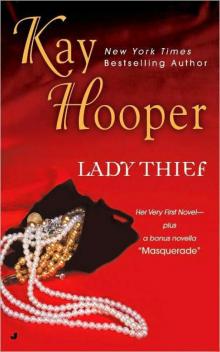 Lady Thief
Lady Thief Summer of the Unicorn
Summer of the Unicorn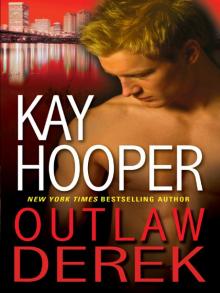 Outlaw Derek
Outlaw Derek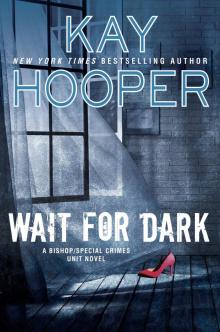 Wait for Dark
Wait for Dark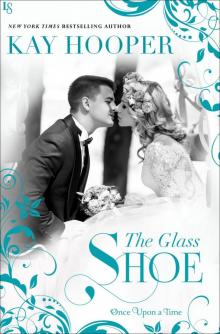 The Glass Shoe
The Glass Shoe It Takes a Thief
It Takes a Thief Zach's Law
Zach's Law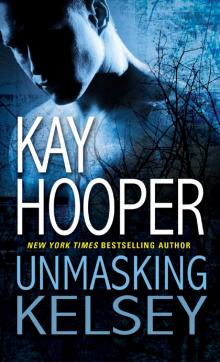 Unmasking Kelsey
Unmasking Kelsey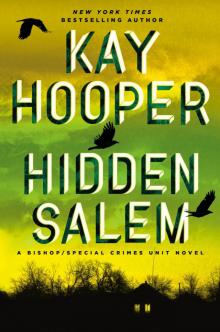 Hidden Salem
Hidden Salem